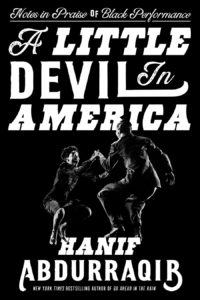“I owe Provincetown a great creative debt,” says the poet and cultural critic Hanif Abdurraqib. He wrote most of his second book, They Can’t Kill Us Until They Kill Us, on an extended stay here in the winter of 2016. He was living in Connecticut at the time and “needed to go somewhere quiet, somewhere free from noise and people,” he says.
He hasn’t forgotten that debt. On Wednesday, April 28, he will read from his most recent book, A Little Devil in America: Notes in Praise of Black Performance, as part of a virtual event sponsored by East End Books Ptown, along with renowned poet Patricia Spears Jones.

Abdurraqib was born and raised in Columbus, Ohio. Except for two-plus years in Connecticut, he’s lived there his whole life. “Columbus is a city that I love,” he says, “but it’s very much immersed in an identity crisis.” Gentrification has changed it dramatically.
A Little Devil in America is a book that defies genre. It combines cultural criticism, memoir, and prose poetry. In it, we get glimpses of Abdurraqib’s past: he was raised Muslim and lost his mother when he was a teenager.
“I grew up writing what felt to me like lyrics,” he says. “I am someone who came to poems by reading them out loud, and so I’ve always been concerned with the musicality of language. I am always attempting to make sonic inquiries as well as linguistic inquiries.”
There are five sections, or “movements,” to the book, and each begins with a personal, almost improvisational, account — “On Times I Have Forced Myself to Dance,” or, in the last section, “On Times I Have Forced Myself Not to Dance.”
The chapters don’t have to be read in order. “The idea is that, hopefully, each piece builds its own small world and that people can open any page and find themselves comfortable wherever they like,” says Abdurraqib.
An early chapter tackles minstrel shows and blackface. As cultural critic, Abdurraqib says, “My role is to contextualize and recontextualize histories and to honor potentially untold stories or to retell stories that deserve a type of correction.”
“On the Certain and Uncertain Movement of Limbs” is a brilliant dissection of Whitney Houston’s performance of “I Wanna Dance With Somebody,” in which the author comes to terms with the fact that Houston can’t dance. Another piece is self-explanatory: “Beyoncé Performs at the Super Bowl and I Think About All of the Jobs I’ve Hated.”
Abdurraqib wants readers to re-watch or re-listen to the performances he references. “My hope is that the writing leads to a revelatory experience, because that’s what it does for me,” he says. Plan on having YouTube and Spotify open on your computer.
“On the Performance of Softness” looks at the music video “Triumph” by the hip-hop group Wu-Tang Clan. The video is about killer bees attacking New York City. There’s a surprisingly tender exchange: “Ghostface pulls Raekwon close and holds his lips to his friend’s head for a few seconds longer than I’d ever been kissed by anyone and Raekwon smiles and I have never seen two men kiss in any capacity before and so I tell myself This must be love and then they and everyone else in the scene all become bees.” Abdurraqib intersperses a memory of beating up a boy at school whom he, only minutes before, wanted to befriend. In the chapter, killer bees become a metaphor for toxic masculinity.
“The whole project of the book was, in some ways, to expand the notions of what I thought of as performance,” he says. “And, of course, gender played pretty heavily into that, especially in terms of how I’ve grown to think better and differently about the ways that I perform masculinity.”

And then there’s race. “I don’t know if race itself is a performance,” says Abdurraqib. Rather, it has to do with societal expectations and overt prejudices. That’s “where the real treacherous nature of performance takes hold,” he says. “What I tried to unravel a bit more in the book was not racist performance but audience engagement with their own ideas of race and how those ideas project on racialized peoples.”
It’s impossible to discuss the book without confronting the issue of diversity on the Outer Cape. Abdurraqib admits that he came to Provincetown in the winter “because the times I’ve been there in the warmer months, it’s kind of hard to be a black person there, to be real.”
One summer, when he was teaching at the Fine Arts Work Center, “in two stores in a row, people asked me if I worked there,” he says. “I was in shorts. I think there are these built-in ideas of who should be working where.”
It’s not just a matter of recruiting diverse talent. “The great conundrum is supporting black artists and having an ecosystem that isn’t always conducive to the living and comforts of those black artists,” says Abdurraqib. “But that’s a tale as old as time at this point.”
Speak of the Devil
The event: “Poetry, Music, & More,” a virtual conversation with Hanif Abdurraqib and poet Patricia Spears Jones, presented by East End Books Ptown
The time: Wednesday, April 28 at 6 p.m.
The place: Register for Zoom link via Eventbrite at eastendbooksptown.com
The cost: $5 suggested minimum donation or “pay what you can”



